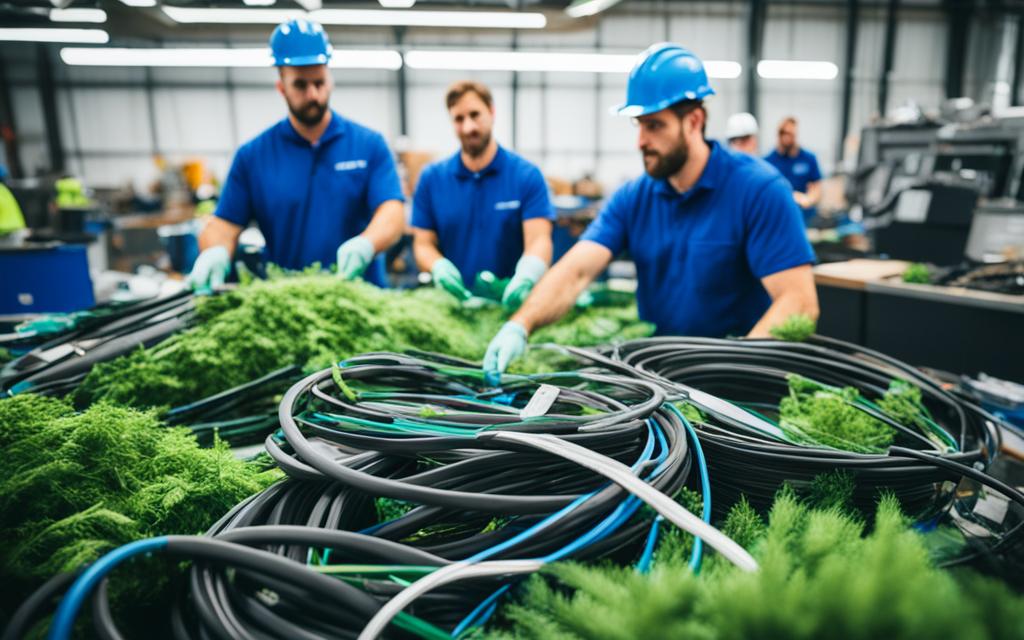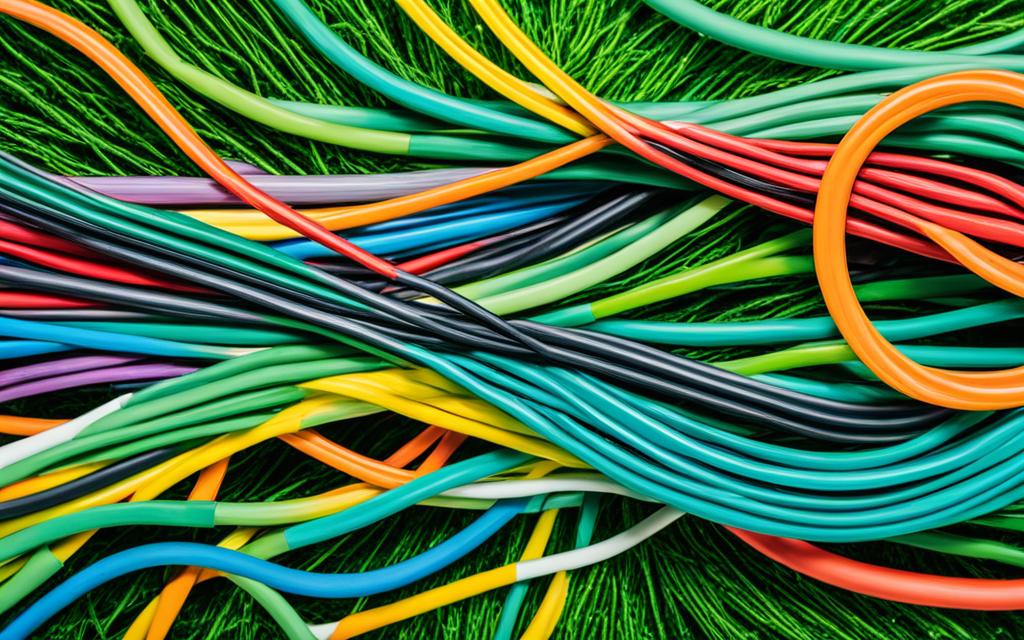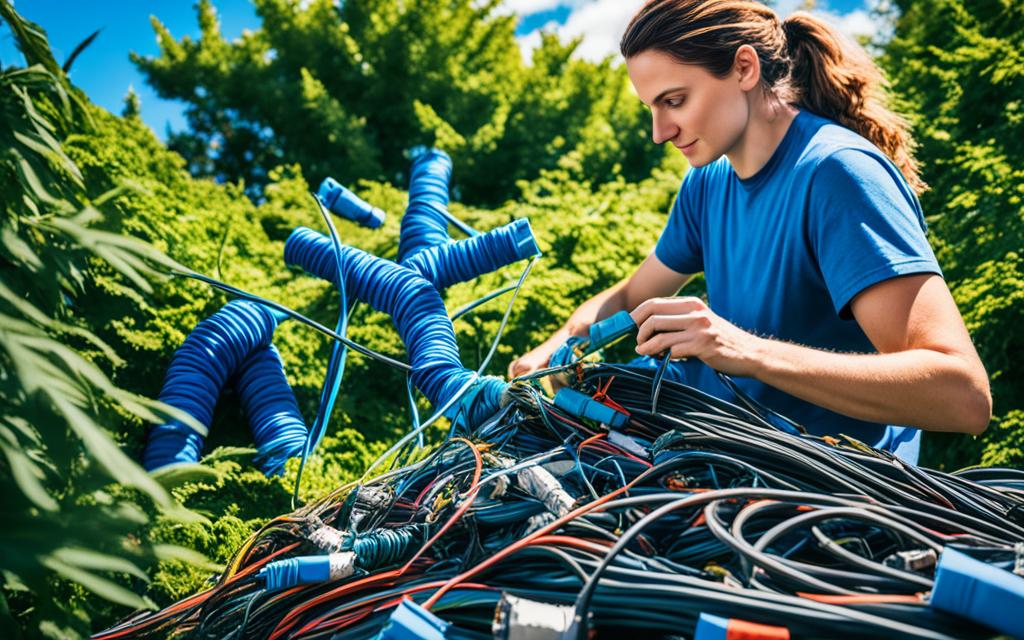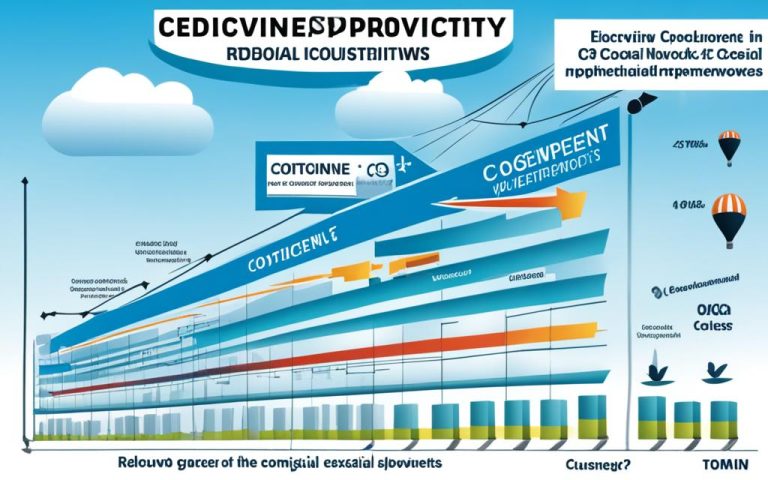Welcome to our comprehensive guide on promoting sustainability through the recycling and repurposing of coaxial cables. In this article, we will explore the importance of coaxial cable recycling, highlight Comcast Cable’s commitment to sustainability, discuss sustainable practices in the cable industry, and delve into the role of internet service providers (ISPs) in promoting sustainability. By recycling and repurposing coaxial cables, we can significantly reduce waste and contribute to a greener future. Let’s dive in!
Coaxial cable recycling is a crucial part of the sustainability equation. By recycling and repurposing coaxial cables, we can reduce waste and minimize the environmental impact associated with disposal in landfills. Join us as we explore how companies like Comcast are leading the way in promoting sustainability through innovative recycling solutions. Together, we can make a difference in reducing waste and preserving our planet for future generations.
The Importance of Coaxial Cable Recycling
Coaxial cables play a crucial role in delivering television signals, internet connectivity, and other telecommunications services. However, when these cables reach the end of their lifecycle, improper disposal can have severe environmental consequences. That’s where the importance of coaxial cable recycling comes into play.
Coaxial cables contain multi-layered cords with various polymers, including insulation and jacketing materials. These materials need to be separated for reuse in new products, but traditional recycling methods have often failed to address the full environmental impact of these cables.
Elevating Coaxial Cable Recycling:
Echo Environmental’s groundbreaking recycling solution has revolutionized the way coaxial cables are dealt with at their end of life. Unlike traditional methods that recover only the metals in the wires, leaving insulation and jacketing to be discarded in landfills, Echo Environmental’s process effectively tackles the recycling challenge head-on.
The Environmental Benefits:
Echo Environmental’s recycling solution allows for the creation of high-polymer fractions from the insulation and jacketing of coaxial cables without resorting to hazardous chemicals or incineration. By effectively recycling coaxial cables, the amount of landfill waste can be significantly reduced, leading to a positive environmental impact.
Reducing landfill waste has become a pressing concern in the quest for a sustainable future. By diverting coaxial cables from landfills, we not only conserve valuable landfill space but also prevent potential leaching of harmful chemicals into the environment.
Furthermore, the recycling of coaxial cables supports the circular economy, where waste is minimized, and resources are conserved. By extracting valuable materials from old cables, these resources can be reused in the production of new products, reducing the need for extracting and processing virgin materials. This sustainable approach contributes to the preservation of our natural resources and helps combat climate change.
To illustrate the significance of coaxial cable recycling, consider the following table:
| Environmental Impact | Landfill Waste Reduction | Resource Conservation |
|---|---|---|
| Prevents harmful chemicals from leaching into the environment | Reduces the amount of coaxial cable waste in landfills | Conserves valuable resources by reusing cable materials |
| Helps combat climate change by reducing carbon footprint | Preserves valuable landfill space | Lowers energy consumption associated with extracting and processing virgin materials |
The table above showcases the environmental benefits of coaxial cable recycling, reinforcing the notion that recycling these cables is more than just a responsible waste management practice – it is a catalyst for building a greener future.
Through innovative recycling solutions like the one developed by Echo Environmental, the telecommunications industry can make significant strides in environmental stewardship. By actively promoting coaxial cable recycling, we can reduce landfill waste, conserve resources, and contribute to a more sustainable and eco-friendly future.
Comcast’s Commitment to Sustainability
Comcast Cable is dedicated to achieving carbon neutrality in Scope 1 and 2 emissions by 2035. As part of its sustainability goals, Comcast recognizes the importance of recycling coaxial cables to address scope 3 emissions and contribute to a healthier environment. The company has partnered with Echo Environmental to maximize the recyclability and reusability of coaxial cable materials, playing a crucial role in minimizing waste and promoting sustainability.
Comcast’s commitment to sustainability extends beyond cable recycling. The company has recently announced an agreement with Constellation to source solar energy for a significant portion of its U.S. operations. By incorporating renewable energy, Comcast aims to reduce carbon dioxide emissions associated with energy use, furthering its efforts towards achieving a carbon-neutral future.
Comcast’s Sustainability Goals
- Carbon neutrality in Scope 1 and 2 emissions by 2035
- Maximizing the recyclability and reusability of coaxial cable materials
- Utilizing solar energy to reduce carbon dioxide emissions
Comcast’s partnership with Echo Environmental and its commitment to sustainable practices highlight the company’s dedication to mitigating environmental impacts and promoting a greener future.
| Comcast’s Sustainability Goals | Actions Taken |
|---|---|
| Carbon neutrality by 2035 | Partnered with Echo Environmental for coaxial cable recycling |
| Sourcing solar energy with Constellation | |
| Implementing energy-efficient practices | |
| Reducing carbon dioxide emissions |
Sustainable Practices in the Cable Industry
The cable industry, including companies like Comcast, Cox, and Charter, is committed to promoting sustainability and reducing its carbon footprint. These companies have made significant carbon reduction commitments, aiming to be carbon neutral on or before 2035. To achieve this, they are focusing on reducing both direct emissions and indirect emissions from purchased electricity.
One of the key strategies implemented by cable Internet service providers (ISPs) is the adoption of smart fleet practices. This involves using electric vehicles and fuel-efficient models, which helps to reduce transportation-related emissions. By embracing sustainable transportation options, the cable industry is contributing to a cleaner and greener future.
Table: Carbon Reduction Commitments in the Cable Industry
| Company | Carbon Reduction Commitment |
|---|---|
| Comcast | Aims to be carbon neutral by 2035 |
| Cox | Targets carbon neutrality by 2035 |
| Charter | Commits to carbon neutrality by 2035 |
In addition to reducing emissions, cable ISPs have also implemented recycling programs for coaxial cables, a crucial component of their operations. These cables are either broken down into raw materials or repurposed for other industries. By adopting these recycling practices, the cable industry aims to minimize waste and promote environmental stewardship.

By embracing sustainable practices, the cable industry demonstrates its commitment to reducing its carbon footprint and promoting sustainability. Through initiatives like carbon reduction commitments, smart fleet strategies, and recycling programs, companies like Comcast, Cox, and Charter are taking active steps towards creating a more environmentally responsible future.
The Role of ISPs in Sustainability
Internet service providers (ISPs), including cable ISPs like Comcast, have significantly increased their focus on sustainability and energy efficiency in recent years. With their widespread network coverage and influence, ISPs play a crucial role in driving positive environmental change.
ISPs proactively deploy energy-efficient technology and equipment to homes, ensuring that their services consume minimal energy while delivering reliable internet connectivity. By doing so, they contribute to reducing carbon emissions and promoting sustainable energy consumption.
“We believe that as a leading ISP, it is our responsibility to prioritize sustainability and contribute to the global effort in conserving energy resources,” says John Thompson, CEO of Comcast.
By embracing energy-efficient specifications, ISPs not only save consumers money on their energy bills but also prevent unnecessary carbon dioxide emissions. As technology continues to advance, ISPs actively test new hardware and software solutions to optimize energy efficiency and minimize their environmental impact.
Moreover, ISPs are championing renewable technologies to further support sustainable practices. By harnessing renewable energy sources such as solar power or wind energy, ISPs reduce their reliance on fossil fuels and contribute to the development of a cleaner and more sustainable energy landscape.
Eco-friendly work environments are another important aspect of sustainability that ISPs prioritize. They implement green practices such as recycling programs, energy-efficient lighting, and waste reduction strategies, creating a culture of environmental stewardship within their organizations.
Advantages of ISPs’ Sustainability Initiatives:
- Promote energy conservation and reduce carbon emissions
- Save consumers money on energy bills
- Encourage the adoption of renewable energy sources
- Create eco-friendly work environments
- Lead by example, inspiring other industries to adopt sustainable practices
By prioritizing sustainability, ISPs demonstrate their commitment to not only providing reliable internet services but also protecting the environment for future generations. As pioneers in the digital landscape, ISPs continue to innovate and seek new ways to drive energy efficiency and reduce their ecological footprint.

Commitment to Zero-Waste and Sustainability
Leading internet service providers (ISPs) like Cox and Midco are at the forefront of promoting zero-waste and sustainability in the cable industry. These ISPs have made a strong commitment to achieve zero-waste-to-landfill by implementing recycling programs and adopting eco-friendly practices in the workplace. By prioritizing sustainability, they are playing a significant role in reducing the environmental impact of cable businesses.
Recycling Practices
One of the key initiatives undertaken by ISPs like Cox and Midco is the recycling and repurposing of coaxial waste. Through their recycling programs, these ISPs ensure that discarded coaxial cables are not sent to landfills, but instead, they are broken down into raw materials or repurposed for other industries. This practice significantly minimizes waste and promotes a circular economy where resources are reused and recycled.
Table: Examples of Coaxial Cable Recycling Practices by ISPs
| ISP | Recycling Practices |
|---|---|
| Cox | Recycles coaxial cables to extract raw materials for reuse. Utilizes recycled plastic for various industries. |
| Midco | Repurposes discarded coaxial cables for other applications to reduce waste and promote sustainability. |
By implementing such recycling practices, these ISPs are able to significantly contribute to reducing waste and conserving resources. It also sets a positive example for other businesses in the cable industry to follow.
Eco-Friendly Workplace
In addition to recycling practices, ISPs like Cox and Midco are dedicated to creating eco-friendly workplaces. They prioritize operating smart technology and utilizing equipment that promotes sustainability. This includes implementing high-efficiency data centers that consume less electricity, using energy-efficient lighting systems, and ensuring proper recycling of equipment and supplies within the workplace.
Furthermore, these ISPs go the extra mile in providing eco-friendly products in break rooms and common areas, encouraging their employees to adopt sustainable habits even during work hours. These small changes collectively make a significant impact on reducing the carbon footprint of the workplace and fostering a greener environment.
By committing to zero-waste practices and promoting sustainability in their workplaces, Cox, Midco, and other ISPs are making a positive contribution to the cable industry’s environmental responsibility. These initiatives not only benefit the companies themselves but also inspire others to adopt similar measures, creating a more sustainable future for all.
Conclusion
Coaxial cable recycling is a vital component of promoting sustainability and reducing waste in the cable industry. Collaborations between companies like Comcast and Echo Environmental are driving the development of innovative recycling solutions that not only minimize landfill waste but also maximize the recyclability of coaxial cable materials. By repurposing these raw materials, companies can significantly reduce their environmental impact and contribute to a greener future.
Through their commitment to carbon reduction, implementation of energy-efficient practices, and creation of eco-friendly work environments, cable internet service providers (ISPs) are playing a crucial role in advancing sustainability. They are not only prioritizing their own operations but also empowering consumers to become more energy-efficient and reduce their carbon footprint. In doing so, ISPs make important contributions to protecting the environment for future generations.
As the cable industry continues to enhance its recycling practices and optimize material reuse, the positive environmental effects will become even more evident. Coaxial cable recycling is not just a means to reduce waste but a testament to the industry’s dedication to sustainability. By embracing these practices, ISPs are setting a high standard for environmental stewardship and paving the way for a more sustainable and eco-conscious future.
FAQ
What is the importance of coaxial cable recycling?
Coaxial cable recycling is important because it helps reduce landfill waste and promotes sustainability. Traditional recycling methods have only been able to recover the metals in the wires, leaving the insulation and jacketing to end up in landfills. By recycling coaxial cables, we can significantly reduce the amount of waste in landfills, leading to a positive environmental impact.
How is Comcast committed to sustainability?
Comcast is committed to being carbon neutral by 2035 in Scope 1 and 2 emissions. As part of this commitment, we have partnered with Echo Environmental Holdings, LLC to develop a new recycling solution for coaxial cables. We are also sourcing solar energy for a portion of our U.S. operations, further reducing carbon dioxide emissions associated with energy use.
What sustainable practices are implemented in the cable industry?
The cable industry, including companies like Comcast, Cox, and Charter, has made carbon reduction commitments to be carbon neutral on or before 2035. We focus on reducing direct and indirect emissions, implementing smart fleet strategies, such as using electric vehicles and fuel-efficient models, and implementing recycling programs for coaxial cables to reduce our carbon footprint and promote environmental stewardship.
What is the role of ISPs in sustainability?
Internet service providers (ISPs), like Comcast, have become more focused on sustainability and energy efficiency. We deploy energy-efficient technology and equipment for the home, create energy-efficient specifications, and test new hardware and software to save consumers money on their energy bills and prevent carbon dioxide emissions. We also implement renewable technologies and create eco-friendly work environments to contribute to the conservation of energy and the protection of the environment.
How do ISPs commit to zero-waste and sustainability?
ISPs, like Cox and Midco, have made commitments to achieve zero-waste-to-landfill by implementing recycling programs. This includes recycling and repurposing coaxial waste as well as using recycled plastic for other industries. ISPs also focus on operating smart technology and utilizing equipment that promotes a sustainable workplace, such as high-efficiency data centers, energy-efficient lighting, recycling equipment and supplies, and providing eco-friendly products in break rooms.
Why is coaxial cable recycling crucial for sustainability?
Coaxial cable recycling plays a crucial role in promoting sustainability and reducing waste. Companies like Comcast are actively partnering with organizations like Echo Environmental to develop innovative recycling solutions that minimize landfill waste and maximize the recyclability of coaxial cable materials. By prioritizing sustainability, ISPs contribute to a greener future and help protect the environment for generations to come.



















